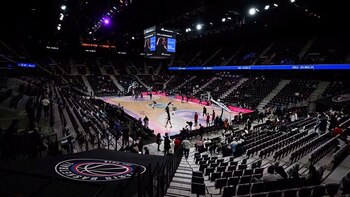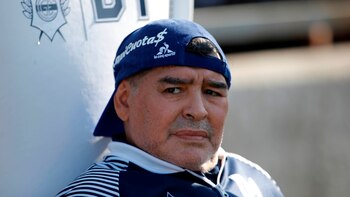
A new sports-cultural epicenter of Olympic stature beats in the 18th arrondissement of Paris, north of the city of light. The Porte de la Chapelle stadium, home to four disciplines during the next Games, celebrated its opening day on Sunday, February 11, with the match between Paris Basketball and Saint-Quentin Basket-Ball for the Pro A National Basketball League.
Also known as Adidas Arena, the home of badminton, rhythmic gymnastics, para badminton and para-weightlifting is one of the five facilities that will leave a legacy after the Games built from scratch and the only one located in the French capital. The list is completed by the Vaires-sur-Marne Nautical Stadium, the Le Bourget Climbing Center, the Olympic and Paralympic Village, whose key delivery is scheduled for March 1st, and the Aquatic Center, the last to be released.
Amélie Oudéa-Castéra, Minister of Sports and Olympic Games of France, and Anne Hidalgo, mayor of Paris, were present and toured the fledgling venue together with leaders of the organization. Hidalgo said she was “proud” of the completion of the work in an area commonly classified as “prohibited” and that during the Olympic event it would have 40,000 police officers.

In keeping with the prototype of a modern stadium and other Olympic venues, such as the Paris La Défense Arena or the Arena de Bercy, versatility transcends as one of the main features. As well as being the home of Paris Basketball, it will prepare for the Five Rings event with a variety of sporting events and musical shows: from Street League Skateboarding to the concert of the Congolese singer-songwriter and dancer Ferre Gola, alternating with the Martial Arts Festival or the Yonex ITX Badminton, a test and qualifying event for Paris 2024.
The character of the show fluctuates and so does the capacity in the incipient building located 2.5 kilometers from the Athletes’ Village and at the foot of the subway line 12 station. With a maximum capacity of 9,000 people for concerts, it is expected to host 7,000 spectators during rhythmic gymnastics (August 8 to 10) and for weightlifting (September 4 to 8) and 6,700 in badminton (July 27 to August 5) and para badminton (August 29 to September 2).
The 7,800 seats were built with recyclable plastic. In the same sustainability tint, recycled aluminum was used in the façade and the concrete used contains low carbon emissions. It is nourished by two gyms, a heating area, bars, an esplanade, a 1,700 m2 terrace with green spaces with views of the city and the first sensory room for people with cognitive disorders.
Originally scheduled for September 2023, the opening date was delayed mainly due to the COVID-19 pandemic and the lack of supplies caused by the War in Ukraine. The project was designed by SCAU architecture & NP2F and the works were carried out by Boyugues Bâtiment Île-de-France. The budget was 138 million euros.
Últimas Noticias
Sinner-Alcaraz, the duel that came to succeed the three phenomenons
Beyond the final result, Roland Garros left the feeling that the Italian and the Spaniard will shape the great duel that came to help us through the duel for the end of the Federer-Nadal-Djokovic era.
Table tennis: Brazil’s Bruna Costa Alexandre will be Olympic and Paralympic in Paris 2024
She is the third in her sport and the seventh athlete to achieve it in the same edition; in Santiago 2023 she was the first athlete with disabilities to compete at the Pan American level and won a medal.

Rugby 7s: the best player of 2023 would only play the medal match in Paris
Argentinian Rodrigo Isgró received a five-game suspension for an indiscipline in the circuit’s decisive clash that would exclude him until the final or the bronze match; the Federation will seek to make the appeal successful.

Rhonex Kipruto, owner of the world record for the 10000 meters on the road, was suspended for six years
The Kenyan received the maximum sanction for irregularities in his biological passport and the Court considered that he was part of a system of “deliberate and sophisticated doping” to improve his performance. He will lose his record and the bronze medal at the Doha World Cup.

Katie Ledecky spoke about doping Chinese swimmers: “It’s difficult to go to Paris knowing that we’re going to compete with some of these athletes”
The American, a seven-time Olympic champion, referred to the case of the 23 positive controls before the Tokyo Games that were announced a few weeks ago and shook the swimming world. “I think our faith in some of the systems is at an all-time low,” he said.





